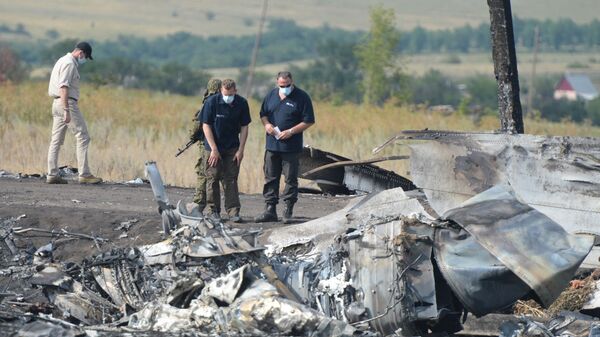The issue was debated by the Dutch lawmakers on Monday evening and the motion was supported by all parties that took part in the discussion.
"The importance of a full fact-finding investigation into the closure of airspace above eastern Ukraine is about more than just state liability," Chris van Dam, a member of the Christian Democratic Appeal, said as quoted by RTL Nieuws.
In 2015, the Dutch Safety Board ruled that there had been sufficient grounds for Ukraine to close the airspace above the conflict zone in the east of the country.
The Malaysian Airlines Boeing 777 crashed on 17 July, 2014 in eastern Ukraine while en route to Kuala Lumpur from Amsterdam, as the region was mired in a conflict with the new government following a coup earlier that year. All 298 people aboard, mostly Dutch citizens, Malaysians and Australians, were killed.
Following the tragedy, Kiev and the self-proclaimed republics in the region blamed each other for the downing, with the latter contending that they had no military equipment that would allow them to shoot down an aircraft at that altitude.
The United States and a number of European nations, for their part, rushed to allege that Russia was responsible for the incident – a claim that was made even before an official investigation was launched.
Shortly thereafter, the Netherlands set up a Joint Investigative Team (JIT) to probe the MH17 case, but left Russia out of the process despite the latter’s consistent offers to assist in the investigation.
JIT’s probe concluded that the aircraft was downed by a Buk missile, ostensibly launched from a Russian anti-aircraft missile brigade stationed in the city of Kursk, not far from the Ukrainian border. At the same time, the Dutch-led team refused to share concrete evidence to corroborate the claims that Russia was responsible for the downing.
Moscow has repeatedly denied the JIT's accusations, saying that the claims were unfounded and the investigation was biased. The Russian side has also emphasised that after being denied access to the formal probe, Moscow had carried out its own investigation, which concluded that it was an older version of the missile made in 1986 and belonging to Ukraine that downed the ill-fated plane. Dutch investigators, however, ignored the information.
In September, an alleged witness and potential suspect in the case of the Flight MH17 downing, Vladimir Tsemakh, returned from Ukraine to Russia under the Moscow-Kiev agreement on simultaneous detainee release. Tsemakh was the ex-commander of an air defense unit in the city of Snezhnoye, controlled by the self-proclaimed Donetsk People's Republic, at the time when the MH17 flight was downed.
On Monday, a spokesperson for the Dutch embassy in Moscow, said that the Dutch Prosecutor's Office had asked the colleagues from Russia to provide legal assistance to question Tsemakh as part of the investigation.




